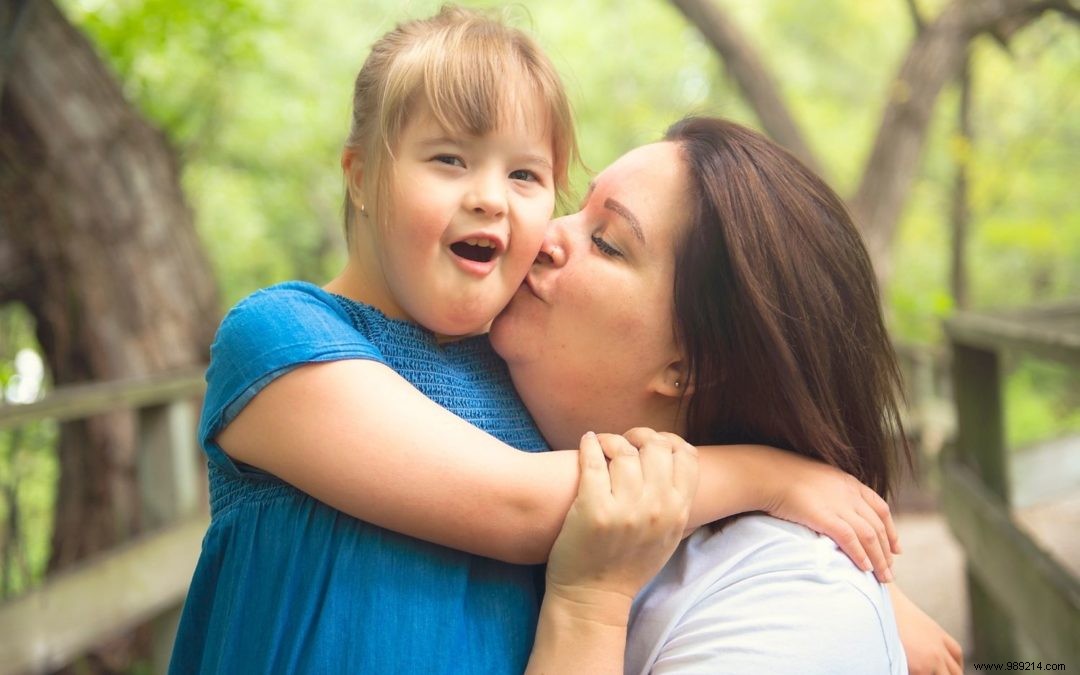
Giving birth to a child with trisomy 21 is a stage in life that can raise as many questions as concerns for parents. In France in 2018, 451 children were born with this genetic disease according to the medical report 2020 Biomedicine.
Parents who welcome a child with trisomy 21 will consider the issues of support and education differently. On the occasion of World Down Syndrome Day, here are our tips for serenely apprehending a balanced and fulfilled future for your child and for you.
Trisomy 21 is a chromosomal abnormality affecting the twenty-first pair of chromosomes in an individual's genome. This pair has three chromosomes instead of two, which causes an imbalance of the whole organism . According to the Jérôme Lejeune Institute, in addition to the physical differences that can be seen, trisomy 21 also causes:
These last characteristics are the hardest for the child to bear. Because of them, but also because of his weaker than average muscle tone, he will often accumulate more fatigue than other children.
From a general point of view, the health of a person with Down syndrome is to be monitored more, because it is generally worse than in the average individual.
A large number of individuals with trisomy 21 have heart or digestive malformations that sometimes need to be treated quickly. But other problems of the same order can also arise later, so specialists recommend a regular medical follow-up . In particular, there is a tendency to develop, among other things, chronic ear infections, endocrine or even neurological diseases. Finally, myopia and hearing problems are also recurring problems for children with Down syndrome.
The generalization of prenatal diagnosis can detect most cases of trisomy 21 in utero, but it also happens that parents realize that their child is a carrier only at the time of birth. Parents of children with Down syndrome often show a certain loneliness at the start when faced with a complicated situation that they had not foreseen. Get closer to the various associations that exist, such as the Perce-neige foundation and do not hesitate to discuss with other parents in the same situation as you through forums.
A child with trisomy 21 has smaller hands and feet, in addition to too low muscle tone. This leads to certain learning and handling difficulties from an early age. This is why specialists recommend rapid follow-up of the child in terms of physiotherapy and psychomotricity. Provide rehabilitation from the first years of life of your child will help him develop his abilities to the best of his ability without presenting a significant developmental delay. Speech therapy should also be provided to improve language learning.
Also consider getting closer to an occupational therapist:it will significantly improve your child's daily life. Occupational therapy is a medical discipline particularly recognized in the treatment of motor and psychomotor disabilities.
If you want to arrange your working time so that you can devote more time to supporting your child, you have the opportunity to become family caregiver . A number of aids have been put in place, such as the AJPP (daily parental presence allowance). This is an allowance paid by the Caisse d'Allocations Familiales allowing you to obtain paid leave days, 310 in number over three years, to take care of your child.
There are other financial aids, such as the AEEH (disabled child education allowance), also offered by the CAF.
The important thing is to first make the most precise diagnosis and the most reliable on your child's degree of disability. Indeed, if individuals with trisomy 21 share many similarities, their adaptation and their intellectual delay present quite strong variations depending on the individual. The Jérôme Lejeune Institute, which brings together doctors and researchers specializing in the medical support of people with Down syndrome, will provide you with a diagnosis as well as valuable advice on the best solutions to put in place for your child. Consultations are fully covered by Social Security.
The school career can be done according to the choice of the parents in a slightly adapted framework, with ULIS schools (localized units for inclusive education) or in an IME (medico-educational institute) which provides a more specialized education.
Finally, the ESATs (help or service establishments through work) offer support solutions for the training and work of people with disabilities. Many initiatives are emerging to promote ever smarter inclusion , such as Cafés Joyeux, which mainly employ people with Down syndrome or autism. Keep in mind that a certain autonomy is possible like Noelia, the first teacher with Down syndrome!
On March 21, 2022, why not take advantage of World Down Syndrome Day to continue sharing and learning?